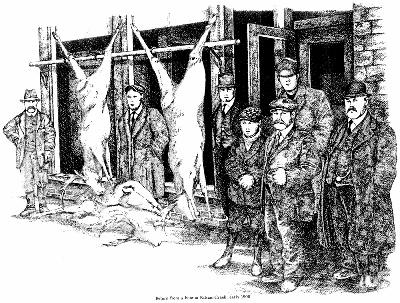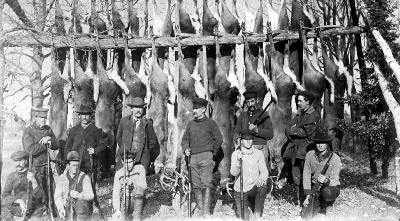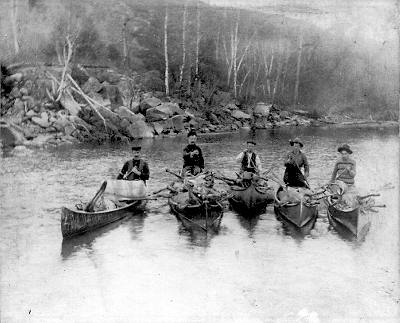 |
January 28, 2005Another Look Back at the Deer
Hunt
|
I received more response from
my brief article and two photos on the deer hunt in October than anything else I
have written recently. The following are some items or interest I acquired
after the last article.
Balsam Creek
You may recall an article
about some lost drawings that were identified as being done by artist Chris
Schouten. One of the set of 4 originals was not found but Chris had a print on
file which he sent me recently and is shown here. The drawing is from an old
photo taken after the hunt at Balsam Creek on Hwy 63 on the way to Temiskaming
Quebec.
 |
Drawing of
hunters after the hunt at Balsam Creek on Hwy 63. Chris Schouten drawing. |
Nipissing Township
I received a touching piece of
nostalgia and some fascinating photographs from Eileen Floyd (Bashak) a
descendent of the Floyd Family, one of the early families in Nipissing Township
in the 1870s. (For more information on the Floyd Family see the book Pioneer
Days in Nipissing Township). Eileen was working on some family history when she
found some notes made by her mother Margaret about the deer hunt in Nipissing a
hundred years ago. Margaret died in 1985 and Eileen was born there but moved
away. Eileen’s grandfather Jack Floyd was a farmer and fire ranger. Sand Lake
is N.W. of Nipissing Village. Margaret wrote “Our own production supplied us
with a plentiful diet with the exception of sugar, flour, tea and some dried
fruits, salt, soda etc. We made our own soap with lye leached from the wood
ashes. There was always an old barrel with ashes for this purpose. For our
winter meat supply there was always the yearly deer hunt.
 |
Photo of Sand Lake Hunt Club in Nipissing Township in
1904. Floyd Family photo. |
My first memories of the Hunt
are even before any “outsiders” came and it became a sporting event. Although
we had beef and pork, chickens, ducks and geese of our own stock, the deer hunt
provided variety and a guaranteed supply for the winter. It also provided the
only holiday the men took in the year.
It took weeks of preparation.
Dad always hunted at Sand Lake where he had a lumber camp when I was a baby.
Weeks before the hunt, the guns were got out and ammunition stocked up.
Supplies were checked and assembled. The log camp had been built and remained
from year to year. The old hunt box remained in our shed loft from year to
year. In it was the necessary cutlery, tin plates, shanty dishes and some pots
and teapots. The box would come down and all was washed. The women would bake
cakes and cookies and blankets would be packed in packsacks. All the stocks of
food would be assembled.
 |
Members of the Sand Lake Hunt Club showing the success of
their hunt 100 years ago. Floyd Family photo. |
Then on the
morning before the season opened, the members (The Sand Lake Hunt Club) would
assemble, many of them with their hounds. The hounds were the only animals on
the farms that did absolutely nothing all year except in the deer season. There
was much competition among the owners as to the merits of each hound (not dog).
The wagons would assemble and the total male population able to move would drive
off with canoes loaded on top as they could only drive so far. It was a mark of
male maturity to be able to go to the hunt. My brother Stuart went when he was
8 years old. They returned with the booty in two weeks and we were assured our
meat supply. It was certainly then a matter of when – not if- we got our
quota.
I remember when
my Dad died I was 18 (November 1923). Dad had been ill all summer and did not
go to the hunt, but the members of the club brought us his deer and my brother
Jim and I skinned it. He was 13. We neither had skinned anything bigger than a
rabbit.
The meat supply
was only a small part of the venture. The tall tales of the hunters provided
entertainment around the stoves all winter. When I read in Longfellow’s
Hiawatha of Iagoo the great boaster – He the marvelous story-teller, He was
someone I knew well. The best hunter, the best shot and infinitely the most
important of all, the best hound. Meantime the women and children had all the
chores under control. How a woman with two, or even six, could accomplish the
execution of her own work and still do the work of one or two men is one of the
mysteries of the time.
Then the
outsiders and sportsmen started coming and the trophy and status symbol was a
fine set of antlers and the whole picture of the hunt was changed.”
Deer Hunting Today
The excitement of
the hunt is still active today as a sport and also serves another useful
purpose. To some extent there are too many deer and they need to be kept to a
reasonable number which hunters do. A major cull took place on Manitoulin
Island last fall. Where I live I see deer regularly and one buck barely missed
my car as it ran onto my road this summer. A Nugget story quotes the OPP and
the MNR on the importance of looking out for deer until they withdraw when the
snow begins. Constable Rick Tass reported 13 collisions involving wildlife in
the month the Nugget story was written.
In early December
men working on the old swing bridge in Magnetawan found a big buck dangling from
the structure by its antlers. An effort to remove the animal was successful but
it later died.
A recent report
in the Globe and Mail reported that cars and trucks ran into wild animals some
4,000 times a day in the U.S. and that 210 people were killed last year. This
was 40 more than the year before and twice as many as in 1993. Deer were
involved in 75% of the accidents.
As exciting as a
deer sighting is we need to be aware that they do present a threat to life and
limb and that our hunters besides having fun and acquiring food like the Floyds
are also providing an important service to the community.
Heritage Perspective Home Page
| 
![]() Past
Forward is now on Facebook "LIKE" us to keep in touch
Past
Forward is now on Facebook "LIKE" us to keep in touch